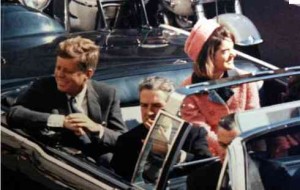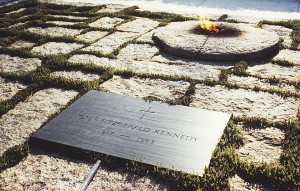 I remember the day vividly. Well, the entire four days, actually. On Friday, November 22, 1963, I was in my junior high classroom that afternoon. It was a little strange at first because the teacher wasn’t in the room; he was huddled with other teachers in the hallway just outside. They were listening to a transistor radio. I recall all the students were wondering what was happening. Then he came in the room and told us that President Kennedy had been shot. No one knew yet how seriously.
I remember the day vividly. Well, the entire four days, actually. On Friday, November 22, 1963, I was in my junior high classroom that afternoon. It was a little strange at first because the teacher wasn’t in the room; he was huddled with other teachers in the hallway just outside. They were listening to a transistor radio. I recall all the students were wondering what was happening. Then he came in the room and told us that President Kennedy had been shot. No one knew yet how seriously.
Gym class came next. We talked about how everything would be fine; after all, this was America, so there was no way our president would die. I don’t remember the exact moment reality hit, but it was shortly after that. Junior high optimism proved too optimistic.
Probably the entire country was glued to the television throughout the weekend and into Monday when the funeral was broadcast. Along the way, I somehow missed the live TV moment when Jack Ruby emerged from the crowd at the Dallas police station and shot Oswald. Other than that, though, I was a witness to history in the making.
Yet there were many things of which I was unaware. As I watched TV icon Walter Cronkite struggle to maintain his composure while reporting the developing story, I didn’t know that the man we were mourning had a stunningly false resumé handcrafted by a father whose primary purpose in life was to place one of his sons in the White House. Those bestselling books and that Pulitzer Prize Jack Kennedy had won were the result of a team of writers who then put his name on them.
While viewing the many tear-stained faces of grieving Americans, I had no knowledge of the way the Kennedy clan hid the president’s many health problems so the public wouldn’t realize he was dependent on painkilling drugs to get by. The public image, of course, was of robust youthfulness. Neither did I know the quack doctor administering those drugs had a nickname—Dr. Feelgood. I wonder if the nation would have felt good about that.
As I held back my own emotions when the widow and her children stood outside as the casket passed by, I was in the dark about the moral character of the man in that casket. If I had known at the time that he was a serial adulterer, aided and abetted by his own Secret Service, would those emotions I felt have been different?
 And as he was lowered into the grave that even now has an eternal flame above it, my youthful ignorance kept me from knowing his very election as president was suspect. Massive voter fraud on his behalf in Illinois and Texas, much of that again orchestrated by his father, is what gave Kennedy the victory. Chicago mayor Richard Daley put his machine to work to dig up enough votes from the graveyards of the city to give the state to the Democrats in 1960. Texas, basically run by JFK’s running mate, Lyndon Johnson, also manufactured more votes in certain districts than actual voters on the rolls.
And as he was lowered into the grave that even now has an eternal flame above it, my youthful ignorance kept me from knowing his very election as president was suspect. Massive voter fraud on his behalf in Illinois and Texas, much of that again orchestrated by his father, is what gave Kennedy the victory. Chicago mayor Richard Daley put his machine to work to dig up enough votes from the graveyards of the city to give the state to the Democrats in 1960. Texas, basically run by JFK’s running mate, Lyndon Johnson, also manufactured more votes in certain districts than actual voters on the rolls.
Many people today don’t know these facts. As a historian, I have no excuse; I have to be honest about what really happened and about the character of the man we remember on this 50th anniversary of his death. That doesn’t make the event any less tragic; the nation never needs a trauma like this. But it doesn’t help us as a people to remain ignorant of truth. We need to be clear-eyed about our history.
As awful as the assassination of a president always is, let’s keep some perspective. John F. Kennedy was not a heroic figure in his personal life. He made many mistakes as president, the Bay of Pigs fiasco being the most obvious. Even his achievements in the Cuban Missile Crisis are mixed. Yes, he forced the USSR to withdraw the missiles, but at what price? He pledged never again to help the Cuban exiles take their country back from the communist dictator Fidel Castro. That tyrant still lives today, and Cuba continues to suffer from the fallout of his stern rule.
Lost in the many documentary tributes appearing on TV this entire month is the real nature of the man being honored and the paucity of his accomplishments. I still experience many of the feelings others do about this tragedy; I saw it unfold myself as a child of twelve. One cannot forget the poignancy of those days and the grief that overwhelmed. Yet now I can step back and analyze it better, distanced somewhat from childish emotions.
Something else I didn’t know on November 22, 1963, was that another man died on that day, far away from my own frame of reference as a young boy in a small Indiana town. Across the Atlantic, in a Great Britain I had never yet visited, an author I had not yet read also passed away. His name was C. S. Lewis. His life and writings have, over time, proven far more influential than that of the man most people remember on this anniversary.
God has a different standard of judgment than the mass of mankind. He sees the heart. On that fateful day in November 1963, it could be that only one of those men who died awoke to find himself in the presence of the One he adored. I will write more of him tomorrow.
